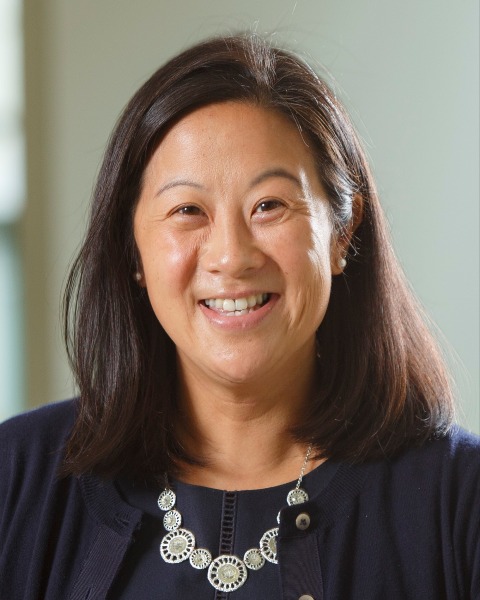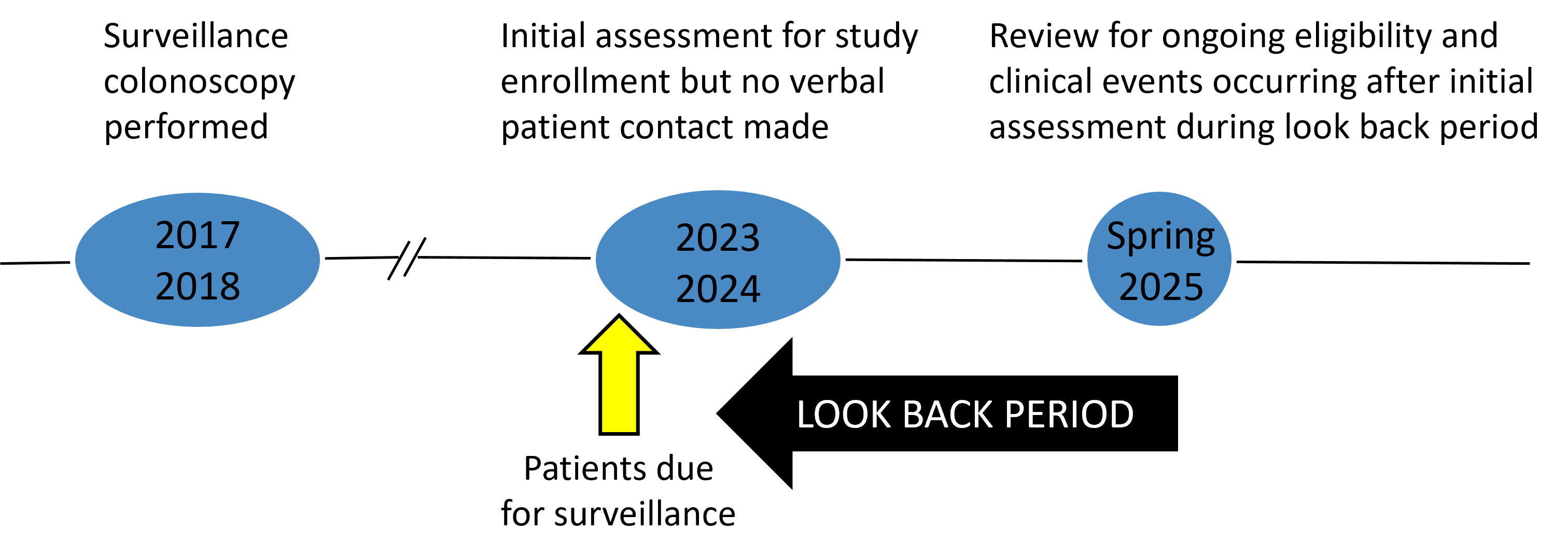Sunday Poster Session
Category: Colorectal Cancer Prevention
P0528 - One-Year Outcomes in Older Adults Overdue for Low-Risk Colon Polyp Surveillance
Sunday, October 26, 2025
3:30 PM - 7:00 PM PDT
Location: Exhibit Hall

Audrey Calderwood, MD, MS (she/her/hers)
Dartmouth Hitchcock Medical Center
Lebanon, NH
Presenting Author(s)
Audrey Calderwood, MD, MS, Kelsey Biddle, MD, Jami-Lynn LeBrun, BA, Yvonne Flores, CCRC, Mahima Sharma, CCRC, Leigh Chestnut, BS, Douglas Robertson, MD, MPH
Dartmouth Hitchcock Medical Center, Lebanon, NH
Introduction: The value of ongoing colon polyp surveillance in older adults is uncertain due to shifting benefits and harms in the context of competing mortality. We examined outcomes of patients overdue for surveillance colonoscopy regarding colonoscopy receipt, health status, and intentions for surveillance.
Methods: We performed a one year look-back of patients age 65-82 overdue for polyp surveillance at a single medical center (Figure 1). Patients were considered overdue if time since last colonoscopy exceeded recommended interval for next colonoscopy. We included patients with low-risk colon polyps (i.e., ≤2 small adenomas or serrated lesions without advanced features) without colorectal cancer (CRC), inflammatory bowel disease or genetic CRC syndrome. Patients were identified as part of a surveillance colonoscopy research study for whom no verbal contact was made after mailed invitation letter was sent. We collected demographics, colonoscopy history, whether they underwent surveillance colonoscopy and the findings, discussed colonoscopy with their primary care provider (PCP), or developed conditions making colonoscopy no longer appropriate.
Results: In Spring 2025, we identified 240 patients previously overdue due for polyp surveillance (median elapsed time since last colonoscopy: 6.4 years). Median (range) age was 70.9 (65-82) years, 46.7% were female. During look back, 76 (31.7%) had completed surveillance, mostly with colonoscopy (N=72) (Figure 2). Among those who underwent colonoscopy with available reports (N=57), 31 (54.4%) had no neoplasia, 13 (22.8%) 1-2 non-advanced adenomas, 8 (14.0%) multiple non-advanced adenomas, and 5 (8.8%) an advanced adenoma. There were no CRCs. Eight (3.3%) were not eligible for surveillance due to death, comorbidities or symptoms. Among the remaining 156, 60 were planning colonoscopy, 3 were planning stool-based test, 10 declined colonoscopy, 3 were told to stop surveillance and 80 did not discuss surveillance with their PCP.
Discussion: Among older adults due for colon polyp surveillance, only a minority completed colonoscopy within the following year of whom most had no neoplasia or only non-advanced adenomas. Very few became too sick for surveillance within this short time-frame. Our work suggests there is an opportunity for providers to directly engage with patients on whether further surveillance offers any benefit and our findings (e.g., low chances of advanced neoplasia) could help inform those discussions.

Figure: Schema of the one year look-back performed in Spring 2025 of patients age 65-82 overdue for colon polyp surveillance initially assessed in 2023-2024

Figure: Outcomes of patients age 65-82 overdue for surveillance colonoscopy for history of colon polyps during a one year look-back period
Disclosures:
Audrey Calderwood indicated no relevant financial relationships.
Kelsey Biddle indicated no relevant financial relationships.
Jami-Lynn LeBrun indicated no relevant financial relationships.
Yvonne Flores indicated no relevant financial relationships.
Mahima Sharma indicated no relevant financial relationships.
Leigh Chestnut indicated no relevant financial relationships.
Douglas Robertson: Freenome – Advisor or Review Panel Member.
Audrey Calderwood, MD, MS, Kelsey Biddle, MD, Jami-Lynn LeBrun, BA, Yvonne Flores, CCRC, Mahima Sharma, CCRC, Leigh Chestnut, BS, Douglas Robertson, MD, MPH. P0528 - One-Year Outcomes in Older Adults Overdue for Low-Risk Colon Polyp Surveillance, ACG 2025 Annual Scientific Meeting Abstracts. Phoenix, AZ: American College of Gastroenterology.
Dartmouth Hitchcock Medical Center, Lebanon, NH
Introduction: The value of ongoing colon polyp surveillance in older adults is uncertain due to shifting benefits and harms in the context of competing mortality. We examined outcomes of patients overdue for surveillance colonoscopy regarding colonoscopy receipt, health status, and intentions for surveillance.
Methods: We performed a one year look-back of patients age 65-82 overdue for polyp surveillance at a single medical center (Figure 1). Patients were considered overdue if time since last colonoscopy exceeded recommended interval for next colonoscopy. We included patients with low-risk colon polyps (i.e., ≤2 small adenomas or serrated lesions without advanced features) without colorectal cancer (CRC), inflammatory bowel disease or genetic CRC syndrome. Patients were identified as part of a surveillance colonoscopy research study for whom no verbal contact was made after mailed invitation letter was sent. We collected demographics, colonoscopy history, whether they underwent surveillance colonoscopy and the findings, discussed colonoscopy with their primary care provider (PCP), or developed conditions making colonoscopy no longer appropriate.
Results: In Spring 2025, we identified 240 patients previously overdue due for polyp surveillance (median elapsed time since last colonoscopy: 6.4 years). Median (range) age was 70.9 (65-82) years, 46.7% were female. During look back, 76 (31.7%) had completed surveillance, mostly with colonoscopy (N=72) (Figure 2). Among those who underwent colonoscopy with available reports (N=57), 31 (54.4%) had no neoplasia, 13 (22.8%) 1-2 non-advanced adenomas, 8 (14.0%) multiple non-advanced adenomas, and 5 (8.8%) an advanced adenoma. There were no CRCs. Eight (3.3%) were not eligible for surveillance due to death, comorbidities or symptoms. Among the remaining 156, 60 were planning colonoscopy, 3 were planning stool-based test, 10 declined colonoscopy, 3 were told to stop surveillance and 80 did not discuss surveillance with their PCP.
Discussion: Among older adults due for colon polyp surveillance, only a minority completed colonoscopy within the following year of whom most had no neoplasia or only non-advanced adenomas. Very few became too sick for surveillance within this short time-frame. Our work suggests there is an opportunity for providers to directly engage with patients on whether further surveillance offers any benefit and our findings (e.g., low chances of advanced neoplasia) could help inform those discussions.

Figure: Schema of the one year look-back performed in Spring 2025 of patients age 65-82 overdue for colon polyp surveillance initially assessed in 2023-2024

Figure: Outcomes of patients age 65-82 overdue for surveillance colonoscopy for history of colon polyps during a one year look-back period
Disclosures:
Audrey Calderwood indicated no relevant financial relationships.
Kelsey Biddle indicated no relevant financial relationships.
Jami-Lynn LeBrun indicated no relevant financial relationships.
Yvonne Flores indicated no relevant financial relationships.
Mahima Sharma indicated no relevant financial relationships.
Leigh Chestnut indicated no relevant financial relationships.
Douglas Robertson: Freenome – Advisor or Review Panel Member.
Audrey Calderwood, MD, MS, Kelsey Biddle, MD, Jami-Lynn LeBrun, BA, Yvonne Flores, CCRC, Mahima Sharma, CCRC, Leigh Chestnut, BS, Douglas Robertson, MD, MPH. P0528 - One-Year Outcomes in Older Adults Overdue for Low-Risk Colon Polyp Surveillance, ACG 2025 Annual Scientific Meeting Abstracts. Phoenix, AZ: American College of Gastroenterology.
